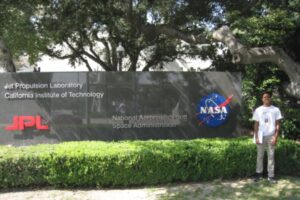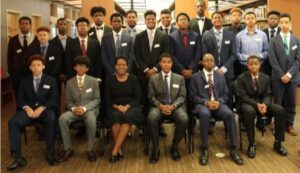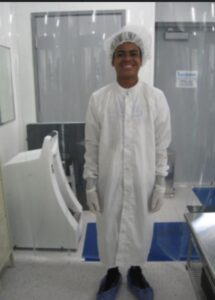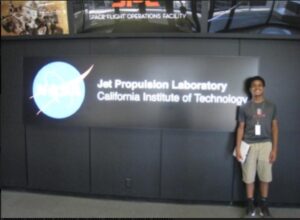Nicholas Richard-Craven is a bright young leader who is truly aiming for the stars. The Pasadena scholar plans to be among the first African-Americans involved in the Mars missions.
Richard-Craven is a remarkable young man who has been striving towards his dream of pursuing a future in aerospace. He is a graduate of Pasadena’s Polytechnic High School with a 4.1 GPA and he will be attending Duke in the fall. He represents the next generation in aerospace.
“I’m interested in astrophysics,” Richard-Craven said. “I’m interested in Mars and what SpaceX is doing. I want to join that mission, it’s my dream.”

Richard-Craven, who was admitted early decision to Duke last December, has a mission: He wants to make an indelible mark in the pages of history.
“I want to include African Americans in the new frontier, which is Mars,” he said. “I want to make sure my people are included in that next generation.”
Richard-Craven who was born and raised in Pasadena, said he’s fortunate he has support of a big family with his three sisters, each of whom attended excellent colleges and his supportive parents. He said he got a chance to follow his dream through a unique social action initiative known as the LAMP Mentor Program, which is a flagship offering of the Gamma Zeta Boulé Foundation.
Ramsey Jay Jr., president of Gamma Zeta Boulé Foundation said Richard-Craven is well on his way down the road to success.
“Clearly Nicholas is someone who dreams big,” Jay said. “Here’s a young man for which the sky’s the limit, so to speak, and he’s actively utilizing the resources at his disposal to propel that opportunity. I think in a few years we’re going to read about something major being invented or created because of his vision. He’s not someone who is merely thinking about going into aerospace, but he’s actually doing it.
Jay said the LAMP Mentor Program empowers talented young men by administering a multidisciplinary enrichment curriculum, combined with scholarship awards, all built around its four pillars Leadership Achievement Management Professionalism.
 “We believe you can see infinite opportunities through exposing young men to people places and programs to which they don’t normally have access,” Jay said.”
“We believe you can see infinite opportunities through exposing young men to people places and programs to which they don’t normally have access,” Jay said.”
And while Richard-Craven admittedly comes from a type-A family, the road to an early decision admission to Duke — one of the finest colleges in the nation — has not been easy. Richard-Craven took four AP classes in junior year and three AP classes in senior year while playing varsity sports and helping his family.
“The AP classes pushed me to learn outside of the classroom,” he said. And the hard work paid off when he found out mid-December that he was accepted early decision to the renowned research university.
“One of my sisters went to Duke and graduated in 2015,” Richard-Craven said. “Since I was 9 years old I’ve wanted to attend Duke. I always loved how diverse it is and it’s one of hte best research institutes and that aligns with my love for space exploration and research.
Richard-Craven’s mother and his grandfather are doctors but he felt he wanted to go a different route.
“I thought about what I wanted to know about our world,” he said. “And the biggest questions, to me, lie out in the universe. Why are we here? What is reality? Studying space and the universe is how we answer those questions.”
After a visit to the Smithsonian, he started reading books about the planets and stars and in eighth grade he shadowed a project systems manager at JPL, named Matt Smith. It’s one of his proudest achievements.
“I got to see the process of how people work together in that environment how people create satellite probes,” he said. “I fell in love with that environment and that made me want to pursue it more.”
 Richard-Craven said he owes a debt of gratitude to Ramsey Jay Jr., president of the Gamma Zeta Boule Foundation, and Gilbert Holmes who oversees the transformative LAMP Mentor program, which mentors deserving young African-American men.
Richard-Craven said he owes a debt of gratitude to Ramsey Jay Jr., president of the Gamma Zeta Boule Foundation, and Gilbert Holmes who oversees the transformative LAMP Mentor program, which mentors deserving young African-American men.
“My grandfather was part of the Gamma Zeta Boulé and my mother knew about the program,” he said.
Richard-Craven continually asks those in the know how he might be involved in the Mars missions.
“I want to do whatever I can to be involved in the Mars missions,” he said. “Maybe engineer some of the satellite probes, or studying the planets. And there are plenty of questions: How are we going to turn Mars into a place that’s habitable? These are things I’m hoping I can put my mind to.”
But while exploring new frontiers is fascinating, there is a serious reason to go to Mars, Richard-Craven said.
“Getting to Mars is what fascinates me,” he said. “Our planet unfortunately is dying. Despite our sustainability efforts, we may have to leave and we need to be prepared for that reality.”
And he has experience in the sustainability aspect of going to Mars.
“I am part of a group at my school called the Shark program, part of a group of students that goes to Caltech looking at sustainability resources that fuel Earth energy,” he said. “I started out wanting to learn about how to save the world first before my love for Mars. I’m proud of that because I’ve learned a ton about chemistry and energy and hope to take that knowledge with me if I join the Mars new frontier, we need to know about sustainability and take that with us to Mars.”
Richard-Craven said he has been inspired by the hard work of his family members and has seen first hand the opportunities that result from a job well done. And he finds he enjoys the research aspect of scientific work.
 “A couple of summers ago I went to a Duke research program, read papers by scientists and learned to understand the research and learned to be a researcher,” he said.
“A couple of summers ago I went to a Duke research program, read papers by scientists and learned to understand the research and learned to be a researcher,” he said.
“I’m also proud of that JPL research I did in eighth grade,” he said. “And lastly I was working for IdeaLab, an entrepreneurship company. They asked me to pitch an idea for enterprise I wanted to start and I pitched them the idea of a Mars news app, focused on Mars.”
Richard-Craven said it’s possible to get a lot of mileage by going the extra distance.
“I stayed with my teachers after school for hours at a time trying to get it right whatever it was,” he said. ” I was struggling in my English class and wanted to get the extra grade up. I would meet with my teacher and ask what I need to do. Taking advantage of my resources and also putting in the work outside my home. I had to use all the work I had in the day. There were a lot of calls to friends, studying and being organized. And I had a ‘village’ of people who want me to do well.”
His advice to others on the way up?
“I think we have to know that we have people who are prepared to help us,” he said.
“We’re not alone and we’re in this together. We’re all going through the same experiences. We have to know that the world has gone through tough times before and made it out. We have to prepare for the future and really make sure we’re united, we have to come together and not segregate ourselves. If we do that we can get the world on a better track.”
Source: SoCal Aerospace News Network
